|
Advantech ARK-2121L Multiple I/O Embedded Box PC
Compact rugged, versatile fanless embedded industrial Box PC platform with multiple modular I/O options, and Intel Bay Trail processing power
(by Conrad H. Blickenstorfer; photography by Carol Cotton)
In this article we'll describe and examine the ARK-2121 platform of compact industrial PCs from Advantech. There are four different versions of this rugged, fanless embedded computer system, and we'll focus on the most basic ARK-2121L version that can be configured for various projects and applications. Compact IPCs like this aren't new. But whereas in the past it was either high performance/high cost (Intel Core processors) or low cost/marginal performance (Intel Atom), a new generation of Intel "Bay Trail" processors provides a happy medium: much improved performance at a still very reasonable cost. And Bay Trail is what this platform is based on.
Targeted to be energy-efficient and environmentally responsible building blocks for applications in factory automation, machine automation, kiosks, and all sorts of self-service applications, these fanless industrial PCs operate reliably in temperatures as low as -4 degrees and as high as almost 160 degrees Fahrenheit. And, in the case of the basic ARK-2121L, they cost less than a modern smartphone.
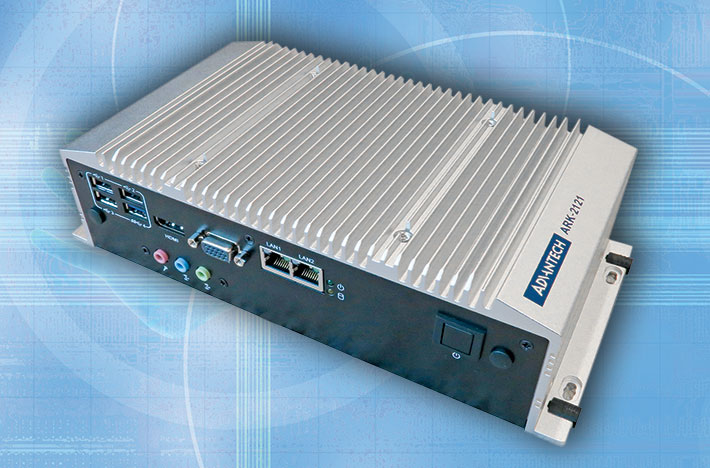
Advantech introduced the ARK-2121 early 2015 as a compact, high-performance fanless Box PC that combines Intel Bay Trail processor computing power and efficiency with Advantech's SUSIAccess remote device management and iManager self-monitoring and management software services. Measuring 9.3 x 5.25 inches, the ARK-2121 has a footprint barely larger than that of a small consumer tablet. It's about three inches tall and weighs around five pounds. That is very compact for an industrial-grade, industrial-strength PC with full Windows computing power and plenty of onboard connectivity.
As is the case with most Box PCs, the ARK-2121L is available with various operating systems. Those include both the standard and embedded versions of Windows 7 and Windows 8, presumably Windows 10, as well as, on a project-by-project basis, various versions of Linux. On the CPU side, the ARK-2121L comes with an Intel "Bay Trail" quad-core Celeron J1900 System-on-Chip processor running at a base frequency of 2.00GHz, and a maximum burst speed of 2.42GHz. Other versions of the ARK-2121 come with either the dual-core 1.33GHz Intel Atom E3825 or the quad-core 1.91GHz Atom E3845, both also part of the Bay Trail lineup, but without the burst speed feature. For a tabular comparison of these three chips, see here.
Applications
What are the intended uses for the ARK-2121 platform? There is no single answer. This is a multi-purpose device with enough computing power for advanced tasks, enough connectivity to connect to almost everything, and the ability to drive two independent displays. And the compact, fanless design means the unit can be deployed almost anywhere, even in places where there is no easy access for repairs and maintenance. Storage and expansion aren't an issue either, as the ARK-2121 can accommodate large capacity mass storage devices, as well as mSATA, WLAN and 3G/4G modules via internal Mini PCIe slots.
For a couple of examples of possible uses, Advantech refers to a public bicycle rental system (see page, or an electronic bus fare collection system (see page), as shown below.
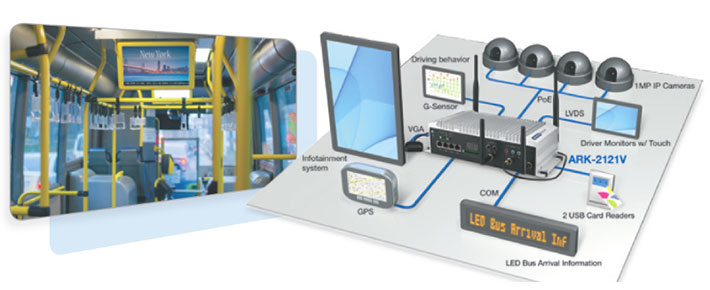
Like almost all current industrial PCs, the Advantech ARK-2121L consists of a steel chassis on which are mounted the various electronic components, and a massive U-shaped finned aluminum heatsink that gives the device its characteristic appearance. The ARK-2121L, like all of Advantech's ARK industrial PCs, is a fanless design. The finned external aluminum heatsink easily handles the removal of heat generated by the processor and subsidiary electronics. How does it do it? By being designed internally so that the finned heat sink fits flush against the processor and also system RAM, with some heat-conducting material for thermal transfer. This is the same thermal design used in the older ARK-2150 that had no problem whatsoever keeping its Intel 3rd gen Core processor cool, although that chip had a much higher thermal design power than the ARK-2121L's Celeron J1900s. In our testing, the ARK-2121L heated up very little and never got more than luke-warm.
Below is a view of the Advantech ARK-2121L from all sides:
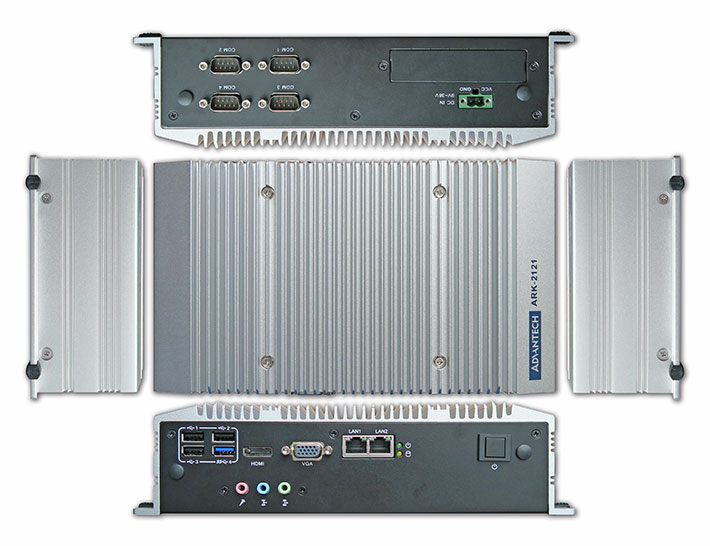
In terms of functionality and connectivity, even the basic Advantech ARK-2121L Box PC doesn't only pack a hefty processing punch, it's also well equipped to interface with a wide variety of peripherals in both legacy (RS232/422/485) serial protocols as well as the high-speed USB 3.0 standard. Our review ARK-2121L was configured to offer the following external ports:
- 1 x USB 3.0
- 3 x USB 2.0
- 2 x Serial RS232
- 2 x Serial RS232/422/485 with auto flow control
- 2 x RJ-45 gigabit LAN
- 4 x Antenna (optional)
- Power (9 to 36 Volt DC)
- 1 x 15-pin VGA video
- 1 x HDMI/DisplayPort
- Audio microphone-in, line-in and line-out
The ARK-2121L is designed to run off either mSATA solid state storage via an internal mini PCIe slot, or a SATA 2.5-inch 12.5mm high hard drive or solid state disk. Our review unit ran Windows Embedded Standard 7 on a SATA III, 6Gb/s 256GB industrial Advantech SQF-S25M8-256G-S8E MLC solid state disk capable of handling temperatures of -40 to 185F (-40 to +85C).
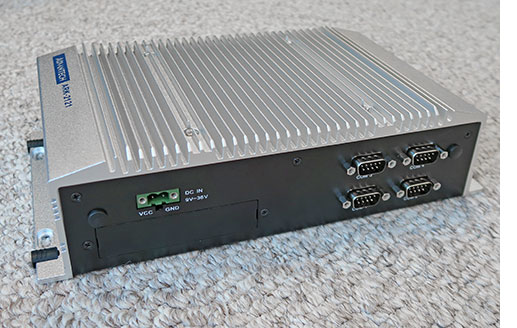 Like all of Advantech's industrial PCs, the interior of the ARK-2121L is exceptionally organized and clean. The motherboard measures roughly 5.5 x 4 inches and is complemented by an I/O daughterboard. Like all of Advantech's industrial PCs, the interior of the ARK-2121L is exceptionally organized and clean. The motherboard measures roughly 5.5 x 4 inches and is complemented by an I/O daughterboard.
Like in most PCs, part of the external connectivity is via edge-mount connectors, and part via cable-connected jacks and ports. This separates core-connectivity from configurable I/O. Since devices such as this industrial PC are often subjected to shock and vibration, all cable connections to the circuit boards are secured via dollops of glue.
The unit's two mini PCI-e slots are fully accessible upon removal of the bottom plate, making configuration and service easy. One of the mini PCI-e slots also contains a SIM card holder.
From a ruggedness standpoint, the enemy of embedded devices such as the ARK-2121 industrial box PCs are usually temperatures extremes and shock/vibration. Since they are not carried around, the drop spec and IP rating (sealing against solids and liquids) that in part define the durability of mobile devices are essentially irrelevant. As a result, there's no IP number and no drop spec, but a very wide operating temperature range (-4 to 158 degrees Fahrenheit for SSD-equipped units), as well as detailed shock and vibration test numbers.
To provide an idea of the relative performance of the ARK-2121L, we ran our two standard benchmark suites, PassMark and CrystalMark. For comparison, we're also listing the results of the physically almost identical but older ARM-2150 we tested a couple of years ago, as well as the larger ARK-3500 that offers PCI/PCI Express expansion, and the tiny ARK 1123.
|
Advantech ARK Box PC Benchmarks and Comparisons
|
|
PERFORMANCE COMPARISON
|
Advantech
|
Advantech
|
Advantech
|
Advantech
|
|
Model
|
ARK-2121L
|
ARK-2150L
|
ARK-3500
|
ARK-1123
|
|
Model (click pic for review)
|

|

|

|

|
|
Year tested
|
2015
|
2013
|
2015
|
2015
|
|
Intel Core processor
|
Celeron J1900
|
i7-3517UE
|
Celeron 1020E
|
Celeron J1900
|
|
CPU Speed
|
2.0/2.42GHz
|
1.7/2.8GHz
|
2.20GHz
|
2.0/2.42GHz
|
|
OS Software
|
WES7
|
WES7
|
WES7
|
WES7
|
|
Thermal Design Power (TDP)
|
10 watts
|
17 watts
|
35 watts
|
10 watts
|
|
CPU Mark
|
2,422.2
|
3,164.8
|
2,198.0
|
2,023.4
|
|
2D Graphics Mark
|
209.0
|
475.8
|
415.0
|
181.4
|
|
Memory Mark
|
616.7
|
923.3
|
826.7
|
444.2
|
|
Disk Mark
|
2,558.0
|
1,322.0
|
733.0
|
594.6
|
|
3D Graphics Mark
|
139.3
|
253.1
|
233.0
|
138.1
|
|
Overall PassMark
|
1,305.9
|
1,382.1
|
974.9
|
787.2
|
|
CM ALU
|
33,069
|
41,554
|
25,977
|
26,844
|
|
CM FPU
|
26,899
|
39,544
|
20,351
|
22,649
|
|
CM MEM
|
20,558
|
23,799
|
27,444
|
19,657
|
|
CM HDD
|
36,874
|
34,772
|
11,377
|
9,048
|
|
CM GDI
|
6,477
|
11,924
|
12,202
|
5,593
|
|
CM D2D
|
3,983
|
1,991
|
1,713
|
3,959
|
|
CM OGL
|
3,982
|
6,318
|
5,010
|
3,511
|
|
Overall CrystalMark
|
131,842
|
159,902
|
104,074
|
91,261
|
Note that even within closely related, or identical, processors, benchmark results often yield confusing numbers (especially in graphics) and it often feels like comparing apples and oranges. In our experience of benchmarking many hundreds of rugged mobile and industrial computing devices, however, we've found that the overall bottomline numbers generally provide a good measure of actual perceived performance.
With the above in mind, it's remarkable how close today's ARK-2121L comes in terms of overall performance to the ARK-2150L of just a couple of years ago, even though the older IPC was equipped with a 3rd gen Core processor that cost several times as much as the J1900 in the 2121L. Score one for progress.
That observation is emphasized when comparing the performance of the 2121L with the Celeron 1020E-powered ARK-3500. While both chips carry the Celeron brand, the 1020E was actually also a 3rd generation Ivy Bridge processor, and one with a much higher thermal design power. Obviously there's more to a processor than just its raw speed, and one 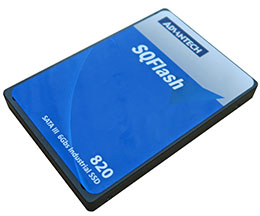 chip may have been chosen over another to provide the specific features needed for a specific market, but the progress is still very remarkable. chip may have been chosen over another to provide the specific features needed for a specific market, but the progress is still very remarkable.
Further note that the type of mass storage used in such systems can have a very large impact on overall performance. Often, selecting the right type of solid state storage can make significantly more of a difference to overall performance than the processor itself.
The super-fast Advantech industrial SSD in our test 2121L, for example, was vastly faster than the rotating hard disk in the ARK-1123 we tested earlier this year. This helped the 2121L to much better overall benchmark numbers although both devices use the same J1900 processor. But again, it's comparing apples to oranges as SSD remains significantly more expensive on a cost-per-gigabyte basis.
Modular expansion: iDoor and EMIO
While general purpose consumer and business PCs need as many different interfaces and ports as possible because users never know what they may have to hook up, the situation is quite different for industrial PCs. Those are almost always deployed for a very specific job with very specific interface requirements. Extra ports are not needed nor wanted, as they only increase the cost. That's why the ARK-2121 platform is highly configurable via two modular expansion systems.
First, the ARK-2121L is compatible with Advantech's iDoor expansion module system. It's a fairly new Advantech concept that uses the Mini PCIe format. Currently (as of September 2015) available iDoor modules can provide digital I/O, RS232 and RS422/485, parallel, 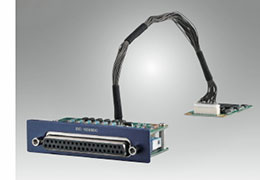 LAN, and CANBus (see list of available modules). LAN, and CANBus (see list of available modules).
The advantage of the iDoor system is that needed communication functionality can be added easily and inexpensively.
The drawback is that each iDoor module needs a Mini PCIe slot, and most systems only have one or two.
So if a systems integrator needs a strong basic platform with communications capability available via one of the iDoor modules, the basic ARK-2121L provides an inexpensive solution because the cost of additional built-in functionality that is not needed for the project falls away.
But what if a functionality is not available in the current iDoor lineup? Then ARK-2121L is also compatible with Advantech's EMIO (Embedded I/O Module) system. EMIO modules can add 4- or 5-wire resistive touch support, CANBus, serial, hi-speed serial, parallel, LVDS, LAN, SATA. The advantages and limitations are the same as those of iDoor: functionality can be added easily ad inexpensively, but each requires a Mini PCIe slot.
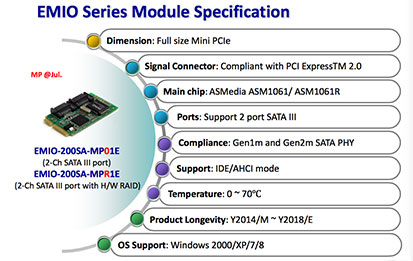 The availability of iDoor and EMIO are likely the reason why Advantech offers the basic ARK-2121L that can be configured for different markets and application areas. It's an elegant, cost-efficient solution. The availability of iDoor and EMIO are likely the reason why Advantech offers the basic ARK-2121L that can be configured for different markets and application areas. It's an elegant, cost-efficient solution.
But what about applications that require functionality for specific markets that go beyond what iDoor and EMIO can add via the sole Mini PCIe slot? For that there are three more specialized versions of the ARK-2121 platform. They are:
- ARK-2121F (six COM ports, using Celeron J1900, see spec sheet),
- ARK-2121S (Outdoor NVR with 4 PoE ports, using Atom E3845, see spec sheet, starting at US$1,245),
- ARK-2121V (In-Vehicle NVR with 4 PoE ports, using Atom E3825 or E3845, see spec sheet, starting at US$1,045).
For an example of an Advantech iDoor module, see here (isolated 16DI/8DO module). For an example of an Advantech EMIO module, see here (2-channel SATA III module).
Value-added software
Like many Advantech embedded products, the ARK-2121 platform includes SUSIAccess software, a device management software suite that allows remote device monitoring, cross-platform access, real-time remote configuration, as well as Acronis system recovery and backup.  SUSIAccess also provides system security via McAfee Embedded Security solutions, automatic alerts, and remote keyboard, mouse and video access. SUSIAccess also provides system security via McAfee Embedded Security solutions, automatic alerts, and remote keyboard, mouse and video access.
Key benefits of SUSIAccess for IoT and intelligent systems applications include the ability to stay in sync with device health status at all time, to reduce
maintenance and via quick access and troubleshooting and energy costs via intelligent power on/off schedules, complete protection from unauthorized applications without the need for continuous updating, optimized and interruption-free backup and recovery with dynamic scheduling, and easy centralized maintenance and management of remote and hard-to-reach devices.
Our review system also included Advantech's Booting Manager, EWF (Enhanced Write Filter) Manager, and a FBWF (File Based Write Manager) utility.
The Advantech ARK-2121 platform
As is, the Advantech ARK-2121L is a cost-effective fanless industrial PC that provides an attractive balance between very respectable performance, compact size, and configurability via two Advantech standards (iDoor and EMIO), making it a suitable platform for any number of potentially hardsh environment applications such as factory automation, machine automation, kiosks, and all sorts of self-service applications.
-- Conrad H. Blickenstorfer, September 2015
Advantech ARK-2121L Multiple I/O Embedded Box PC Specs:
| Status |
Added 09/2015
|
| Type |
Multiple I/O Embedded Box IPC
|
| CPU Type |
2.0GHz Intel Celeron J1900 (max. burst speed 2.42GHz)
|
| BIOS |
AMI EFI 64Mbit
|
| OS |
Windows Embedded Standard 7, Windows 7 Professional, Windows 8, Windows Embedded Standard 8, Linux
|
| Memory |
Max 8GB DDR3L 1333MHz in one 204-pin SODIMM socket |
| Graphics Controller |
Integrated Intel HD Graphics |
| Watchdog Timer |
255-level timer intervals, software setup |
| Graphics: VGA |
Max. resolution 2048 x 1152 pixel @ 60Hz |
| Graphics: HDMI |
HDMI 1.4a; supports 1080P @ 60Hz |
| Graphics: DisplayPort |
Up to 2048 x 1152 @ 60Hz |
| Graphics: Dual Display |
Yes, VGA + HDMI
|
| LAN |
2 x 10/100/1000 Mbps (Intel i210) LAN RJ45 |
| Storage |
1 x SATA/300 2.5" HDD, 1 x internal full-size mSATA socket
|
| Housing |
Aluminum with DIN-rail, VESA and/or wall mounts
|
| Vibration |
With SSD: 3 Grms, IEC 60068-2-64, random, 5 ~ 500 Hz, 1hr/axis.
|
| Shock |
With SSD: 30 G, IEC 60068-2-27, half sine, 11 ms duration.
|
| EMC |
CE/FCC Class A, CCC, BSMI
|
| Safety |
UL, CCC, BSMI
|
| Operating temperature |
With extended temp. peripherals: -4° to 158°F (-20° to °70C)
|
| USB |
1 x USB 3.0, 3 x USB 2.0
|
| Serial |
2 x RS232 serial, 2 x RS232/422/485 with auto flow control |
| Audio |
HD Audio Realtek ALC888S chipset, line-in + line-out jacks |
| Expansion |
1 x full-size Mini PCIe with SIM holder |
| DIO |
??? 8-bit programmable GPIO |
| Size |
10.4 x 5.25 x 2.7 inches (265 x 133 x 68 mm) including mounting lip
|
| Weight |
5.1 pounds (2.3 kg) |
| Power |
AC/DC, DC19V/3.42A
|
| Price |
ARK-2121L starting at US$685 |
| Webpage |
Advantech ARK-2121L page and user manual
|
| Datasheet |
 ARK-2121L spec sheet ARK-2121L spec sheet |
| Contact |
Advantech Corporation
13 Whatney
Irvine, CA 92618
Toll Free: 1-800-866-6008
Ph: 949-420-2500
Fax: 949-420-2501
ECGInfo@advantech.com
www.advantech.com
|
Advantech Co. Ltd.
No.1, Alley 20, Lane 26, Rueiguang Road
Neihu District, Taipei Taiwan 114, R.O.C.
Tel: 886-2-2792-7818
Fax: 886-2-2794-7301
www.advantech.com
|
|

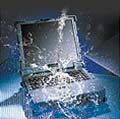

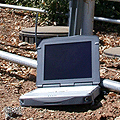

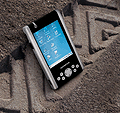
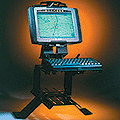








 Like all of Advantech's industrial PCs, the interior of the ARK-2121L is exceptionally organized and clean. The motherboard measures roughly 5.5 x 4 inches and is complemented by an I/O daughterboard.
Like all of Advantech's industrial PCs, the interior of the ARK-2121L is exceptionally organized and clean. The motherboard measures roughly 5.5 x 4 inches and is complemented by an I/O daughterboard.




 chip may have been chosen over another to provide the specific features needed for a specific market, but the progress is still very remarkable.
chip may have been chosen over another to provide the specific features needed for a specific market, but the progress is still very remarkable.
 LAN, and CANBus (
LAN, and CANBus ( The availability of iDoor and EMIO are likely the reason why Advantech offers the basic ARK-2121L that can be configured for different markets and application areas. It's an elegant, cost-efficient solution.
The availability of iDoor and EMIO are likely the reason why Advantech offers the basic ARK-2121L that can be configured for different markets and application areas. It's an elegant, cost-efficient solution.
 SUSIAccess also provides system security via McAfee Embedded Security solutions, automatic alerts, and remote keyboard, mouse and video access.
SUSIAccess also provides system security via McAfee Embedded Security solutions, automatic alerts, and remote keyboard, mouse and video access.
